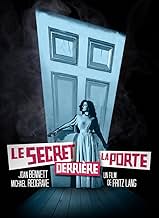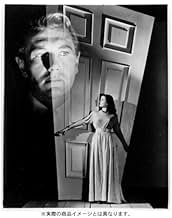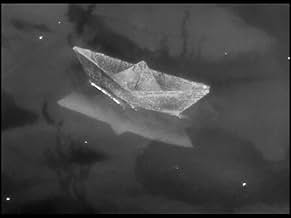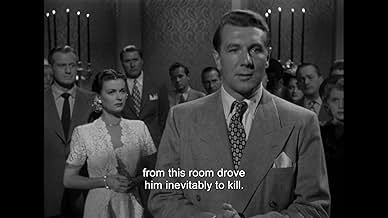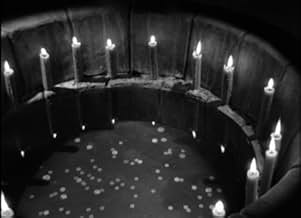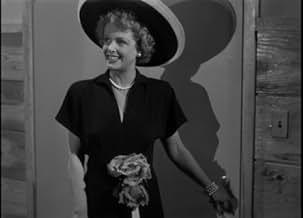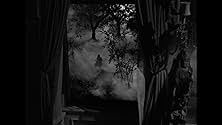Cuando una encantadora mujer y su nuevo marido se instalan en una antigua mansión de la costa este, ella descubre que él podría querer matarla.Cuando una encantadora mujer y su nuevo marido se instalan en una antigua mansión de la costa este, ella descubre que él podría querer matarla.Cuando una encantadora mujer y su nuevo marido se instalan en una antigua mansión de la costa este, ella descubre que él podría querer matarla.
- Dirección
- Guión
- Reparto principal
- Altar Boy
- (sin acreditar)
- Townsman
- (sin acreditar)
- Sarah
- (sin acreditar)
- Guest in Home Tour
- (sin acreditar)
- Guest in Home Tour
- (sin acreditar)
- Judge
- (sin acreditar)
- Small Mexican Knife Fighter
- (sin acreditar)
- Country Squire
- (sin acreditar)
Reseñas destacadas
After a whirlwind romance, Celia Barrett (Bennett) marries Mark Lamphere (Redgrave) but finds once the honeymoon is over his behaviour becomes quite odd...
A troubled production and troubling reactions to it by the critics and Lang himself! Secret Beyond the Door is very much in the divisive half of Lang's filmic output. Taking its lead from classic era Hollywood's keen interest with all things Freudian, and doffing its cap towards a number of "women in peril at home" films of the 1940s, it's a picture that's hardly original. Yet in spite of some weaknesses in the screenplay that revolve around the psychological troubles of Mark Lamphere, this is still a fascinating and suspenseful picture.
I married a stranger.
Draped in Gothic overtones and astonishingly beautiful into the bargain, it's unmistakably a Lang film. His ire towards the cast and studio, where he was usurped in the cutting room and with choice of cinematographer, led Lang to be very dismissive towards the piece. However, it contains all that's good about the great director. Scenes such as the opening involving a paper boat on ripples of water, or a sequence that sees Mark dream he is in a courtroom full of faceless jurors, these are indelible images. Then there's the lighting techniques used around the moody Lamphere mansion that are simply stunning, with Cortez (The Night of the Hunter) photographing with atmospheric clarity.
Blades Creek, Levender Falls.
Elsewhere the characterisations are intriguing. Mark is troubled by something and we learn it's about women in his life, while his "hobby" of reconstructing famous murder scenes in the rooms of the mansion, is macabre and really puts a kinky distortion in the narrative. Celia marries in haste but is surprisingly strong, her character arc given heft by the fact we think she may well be prepared to die for love. Then there's the house secretary, Miss Robey (O'Neil), a shifty woman with a headscarf covering an unsightly scar on one side of her face, and Mark's young son David (Mark Dennis) who is cold and detached and has some disturbing theories on his father's means and motivations.
Lilacs and locked doors.
Cast performances are not all top grade, and even though Redgrave doesn't push himself to required darker territories, the performances are involving and worthy of the viewer's undivided attention. Rózsa's musical score is a cracker, deftly switching from the romantic swirls that accompany Mark and Celia during their love courting, to being a stalking menace around the Lamphere house and misty grounds when danger and psychological distortion is near by. Technically it's a remarkable movie, where even allowing for some daftness involving the psychobabble, it's a picture that Lang fans can easily love. There are those who detest it, very much so, but if it does hit your spot it will get inside you and stay there for some time afterwards. 8/10
Joan Bennett plays Celia, a young lady who acquires a large amount of money after her brother's death and decides to take a holiday. It is here that she meets Mark Lamphere (Michael Redgrave), a mysterious and charming gentleman who excites in Celia intense suppressed feelings of rebellion and exhilaration. Following their marriage, a hastily-decided proposition that can only lead to trouble, Celia immediately begins to notice peculiarities in her new husband, and, after her arrival at Mark's extravagant residence, she finds the dwelling haunted by the shadow of his previous wife. Mark, it seems, houses an unhealthy preoccupation with murder, and has made a hobby out of collecting entire rooms in which unspeakable atrocities of passion were committed. But what of the one room that is kept securely locked, never to be opened by anyone? Celia concludes that the secret to unlocking the inner depths of her husband's disturbed mind lies within that single room, beyond the forbidden door. Though Silvia Richards' screenplay, from a story by Rufus King, often seems too incredible to take seriously, Lang's film remains an interesting achievement, and is nothing if not entertaining.
I found the promotional material for 'Secret Beyond the Door' to be grossly misleading. The image of Joan Bennett standing before a significantly-distorted door prompted me to expect a film of extreme German Expressionism, in the same vein as 'The Cabinet of Dr. Caligari (1920).' Fritz Lang, who developed his career in Germany during the 1920s, and having often used elements of the style, would presumably have been very adept at recreating the devilishly-twisted labyrinths of the human mind, but the only scene to even approach my stylistic expectations was the appropriately ambiguous and shadowy dream sequence, in which Michael Redgrave both prosecutes and defends his malevolent tendencies in court {this particular scene may even have influenced Hitchcock's heavily-stylised courtroom trial in 'Dial M for Murder (1954)}. The remainder of the film has the appearance of a typical 1940s film noir, with suitably shadowy cinematography by Stanley Cortez, supplemented by a voice-over by Joan Bennett. Also note the similarity between the character of Miss Robey (Barbara O'Neil) and Mrs. Danvers (Judith Anderson) from 'Rebecca,' most particularly in their respective final actions in each picture.
The story, very loosely based on the old Bluebeard fairy tale, is interesting, but the pacing of the film is off, and you never really feel much tension. There are some interesting characters in the house, especially the secretary, but they aren't very developed. So much more could have been done in this area, to make it a truly great film.
Without giving anything away, I doubt many of us would have made the same decision that the main characters did in the end. But don't let that distract you from the truly beautiful fashion of this film.
Fritz Lang's bleak cinematography and haunting use of music help to create the atmosphere that a story of this nature needs in order to work effectively. The focus on the door helps to create the tension as to what the secret is throughout the movie, and Fritz Lang seems keen to capitalise on that as we see Joan Bennett's narration change from how she feels personally to driving herself crazy as she tries to decipher what's behind the door. The characters in the story are interesting, and they need to be as this film is mostly character based. We follow Celia Lamphere, and we are given her thoughts by way of the aforementioned narration. Narration is often found in scripts that have been written by people that don't know how to write good scripts. However, in this case it actually helps the film to move along. In order for the story to work, we need to know what the character is feeling, so in this case narration is helpful to the story.
As I've mentioned, the ending isn't all that good, but the suspense builds nicely and there's much to like about this film. If you're new to Fritz Lang, though, I certainly recommend the classics 'M' and 'Metropolis' before this, and also from his American films; 'Fury', 'Scarlet Street', 'Beyond a Reasonable Doubt' and 'While the City Sleeps' get my thumbs up.
The story concerns a beautiful woman, Celia (Joan Bennett) who falls madly in love with a mysterious and moody man, Mark Lamphere (Michael Redgrave) whom she meets while on a trip. She goes to live with him at the family home, which is run by his sister (Anne Revere). It's there she discovers a few things. One is that Mark was married before, is a widower, and has a son (Mark Dennis). Mark also has a secretary (Barbara O'Neil) who covers one side of her face with a scarf to cover a scar from a fire. Mark, she finds, also has a wing where he houses a collection of rooms in which famous murders have taken place. There is one room, however, which is always kept locked. Celia wants to know what's beyond that door, and what makes her husband so moody.
"Beyond the Door" takes inspiration from two other Hitchcock films, Spellbound and Notorious, and taps into the postwar interest in psychology. There is a voice-over narration from the troubled Celia, who recounts her dreams. The film is very atmospheric, the music grand and suspenseful and, though one may be able to guess how it ends, the story is very intriguing. The ending, due to some narrative gaps, is somewhat disappointing.
This isn't Lang's best film but one can certainly see the master's touch in the gloom, the fixation on the door, and the cinematography. Joan Bennett (whom I saw in person and was unbelievably tiny) shines as she usually did under Lang's direction. She could play both sophisticated and glamorous as well as trashy and sweet-smart. Here, in a funny way, she combines both - the character is a bit of a classy femme fatale. Redgrave is properly passionate one minute and distant and a little weird the next. I would have loved to have seen someone like Dirk Bogarde tackle this role a few years later.
Derivative but very good.
¿Sabías que...?
- CuriosidadesThe grove of trees through which Celia (Joan Bennett) runs when she flees the house is the same grove through which the Wolf Man ran in El hombre lobo (1941), also made by Universal. In particular, the tree, against which she leans, is the same one under which the Wolf Man was beaten.
- PifiasWhen Celia takes an impression of the key in wax, she only takes the impression on one side, which would render the key made from that impression useless without the reverse side.
- Citas
Mark Lamphere: You were living that fight. You soaked it all in - love, hate, the passion. You've been starved for feelings - any real feelings. I thought: 20th Century Sleeping Beauty. Wealthy American girl who has lived her life wrapped in cotton wool but she wants to wake up. Maybe she can.
Celia Barrett: Is it as hard as all that?
Mark Lamphere: Most people are asleep.
- ConexionesFeatured in Vampira: Secret Beyond the Door... 1947 (1956)
Selecciones populares
- How long is Secret Beyond the Door...?Con tecnología de Alexa
Detalles
- Fecha de lanzamiento
- País de origen
- Idiomas
- Títulos en diferentes países
- Secret Beyond the Door...
- Localizaciones del rodaje
- Empresa productora
- Ver más compañías en los créditos en IMDbPro
Taquilla
- Presupuesto
- 1.500.000 US$ (estimación)
- Duración
- 1h 39min(99 min)
- Color
- Relación de aspecto
- 1.33 : 1

